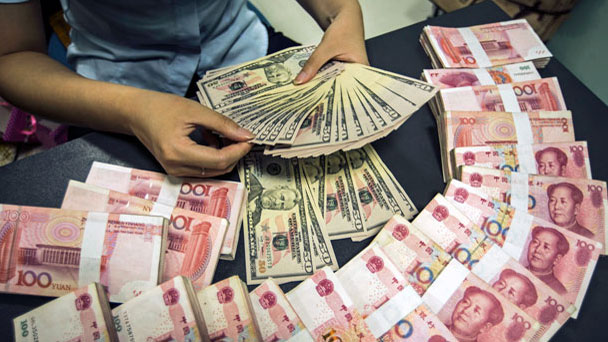Media Report

- CNBC reports: "China's central bank altered how it manages the country's currency, signaling that authorities have no intention of using the yuan as a weapon in the ongoing trade war with the United States, analysts said. The yuan has come under intense pressure in recent weeks on concerns about the outlook for the Chinese economy, the world's second largest, in part resulting from the ongoing tariff conflict with the U.S. On Friday, the People's Bank of China appeared to respond to that pressure, announcing that it was reintroducing a calculation method it called a "counter-cyclical factor" to keep the yuan's daily midpoint fixed to a relatively stable value."
- Bloomberg reports: "The U.S.'s trade war with China is about to get uglier. After a long, hot summer spent weighing risks and firing warning shots, the hawks in President Donald Trump's administration have gained the upper hand -- and they're set to unleash a fall offensive. Talks in Washington between the world's two largest economies yielded little visible progress last week toward a cease-fire. Looming instead are new tariffs that Trump has threatened to impose on some $200 billion in annual imports from China, and Beijing's already-promised retaliation. "We're facing an escalating trade war over the next few months," says David Dollar of the Brookings Institution, who served as the U.S. Treasury's top man in China under the Obama administration."
- Reuters reports: "World stocks rose to their highest level in over two weeks on Monday, following reassuring comments from the U.S. Federal Reserve chief, signs of progress on a U.S.-Mexico NAFTA trade deal and a bid by China's central bank to stabilize the yuan. A stronger-than-expected German business sentiment survey added to the upbeat mood in Europe, with stock markets in Paris and Frankfurt up about 0.5 percent each .GDAXI .FCHI. British markets were closed for a public holiday, while U.S. stock futures ESc1 1YMc1 pointed to fresh gains on Wall Street."
Calendar
- 2018-08-26 Trump is right. His trade war with China is causing a huge problem with North Korea
- 2018-08-24 White House Criticizes China Over El Salvador Recognition
- 2018-08-23 Beijing retaliates as new US tariffs kick in on $16 billion of Chinese goods
- 2018-08-22 China Has Appointed a New Propaganda Chief to Polish Its Image Abroad
- 2018-08-21 Companies Warn More China Tariffs Will Cripple Them and Hurt Consumers
- 2018-08-20 China Trade War: Where Are We Now?
- 2018-08-17 US-China trade talks will focus on yuan weakness, experts say
- 2018-08-16 China: Trade talks with the US are back on
- 2018-08-15 China could reportedly use its ‘unwritten’ tech rules as an ‘invisible tool’ against US firms
- 2018-08-14 China’s Growth Engine Sputters as It Battles U.S. Over Trade
News
- Reuters China's higher inflation not big problem: state planner vice-chairman
- Bloomberg China Stock Fund That's Up 618% Since 2008 Says Stay in Cash
- CNBC Mohamed El-Erian sees a 60% chance that Trump's hard line with China and Europe yields 'fairer trade'
- The Wall Street Journal Japanese Official Says China Has a High-Tech Edge: Totalitarianism
- Reuters China targets rumors, religion in updated party rules
- The Wall Street Journal Global Tech Rally Fractures as Investors Cool on Chinese Firms
- CNBC China's new currency policy is a dovish signal in the trade war, analysts say
- Bloomberg Trump's China Hawks Prepare to Swoop as Trade Talks Go Nowhere
- Market Watch China central bank signals it doesn't want a 'full-scale currency war'
- Reuters World stocks at highest in over two weeks, China's yuan rallies
- CNBC US-China trade war is poised to intensify: 'Both sides think they have the upper hand'
- The Wall Street Journal Japan Auto Makers, Facing Uncertain Road in U.S., Look to China
- TIME China's Didi Chuxing Suspends Carpool Service After Second Woman Killed
- CNBC A battered Trump may escalate the US-China trade war ahead of midterms
- CoinTelegraph China's Baidu Joins Tech Giants Tencent, Alibaba in Imposing Fresh Anti-Crypto Measures
Commentary
- Bloomberg Grab a Shovel, China's Ready to Build Again
- Forbes This Week In China Tech: A Robot Will Collect Your Debt, China Real Estate Goes Virtual
- Bloomberg China's Tech Growth Is Getting More Expensive
- The Wall Street Journal China Suddenly Has Trouble Building Things
- NJ.com China's ban upsets the recycling cart in N.J.
